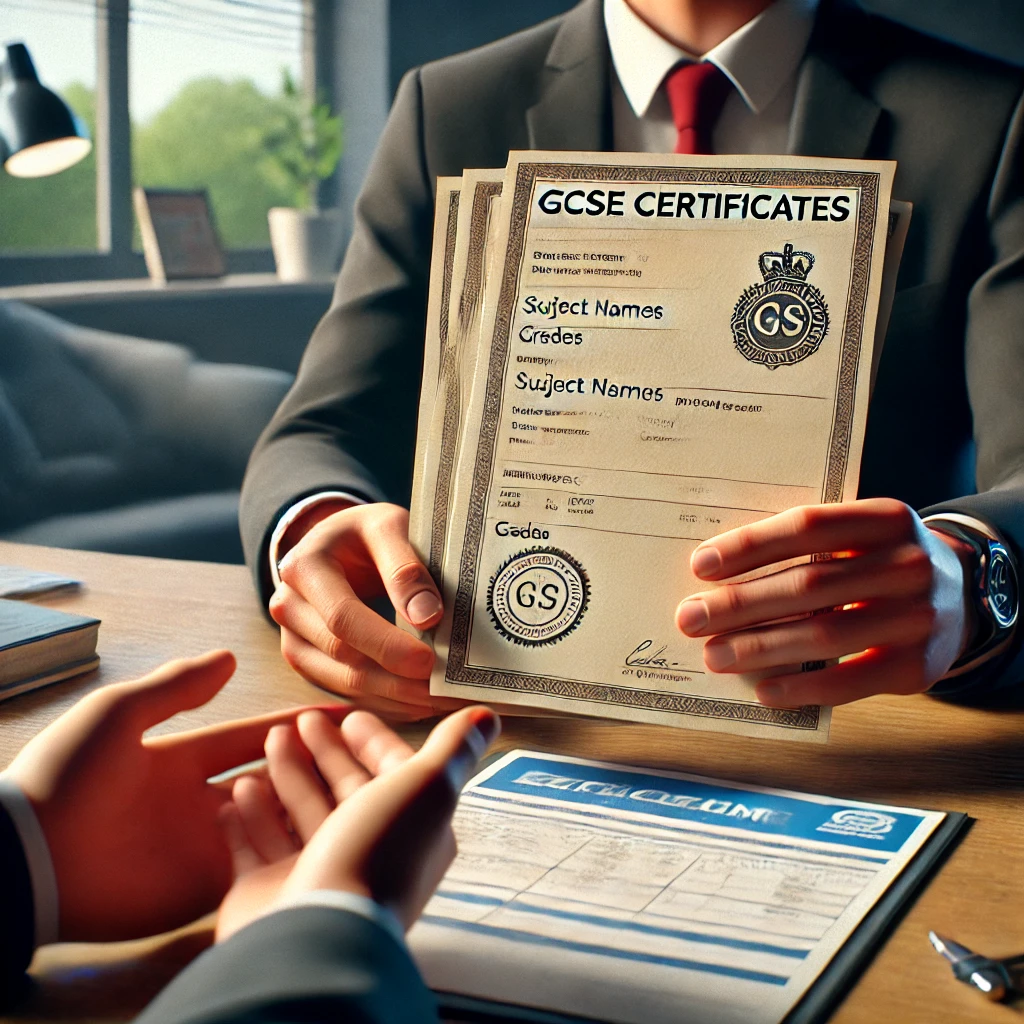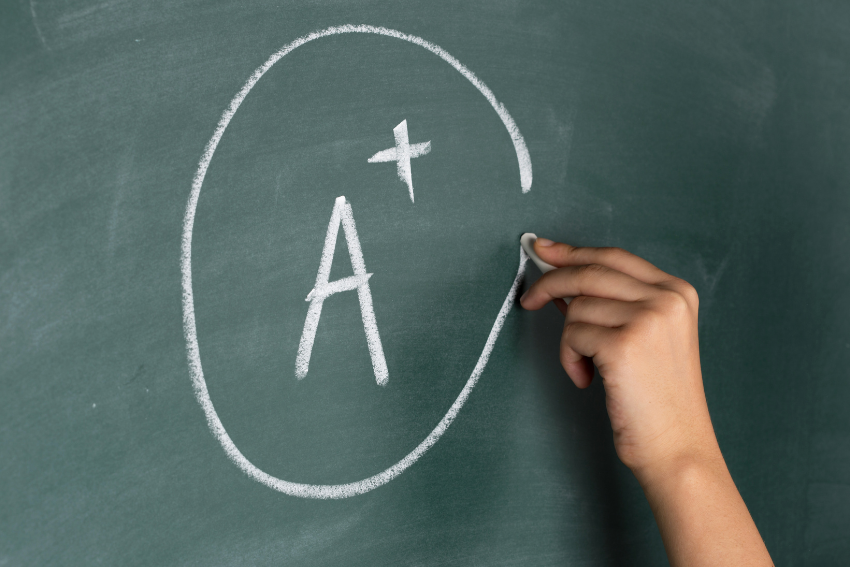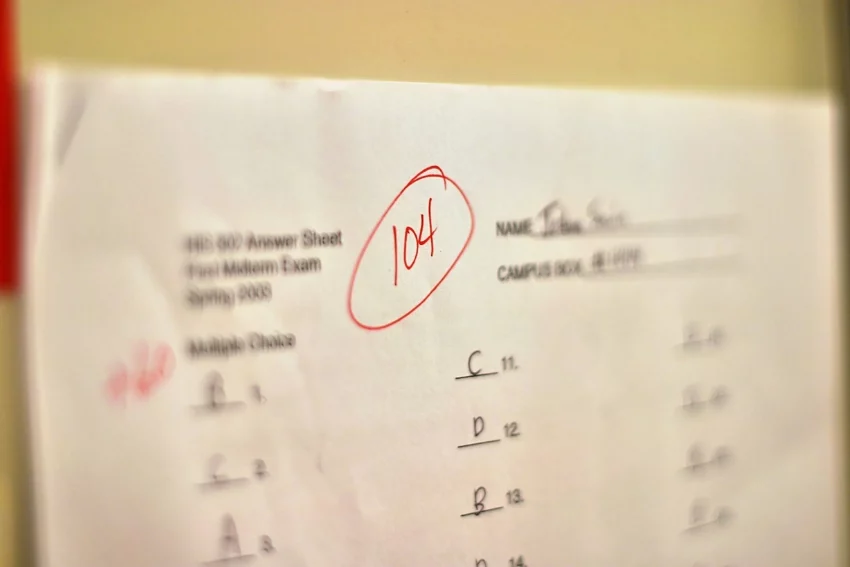What is a GCSE certificate? How and when do students get it? In this guide, we answer every question parents and students might have about GCSE certificates. GCSE certificates, or General Certificate of Secondary Education certificates, are qualifications that students in the United Kingdom typically receive upon completing their secondary education, usually at age 16.
In addition, these certificates serve as formal proof that students have acquired specific knowledge and skills in various subjects over a two-year study period. Moreover, the primary purpose of GCSE certificates is to assess students’ abilities in a range of academic areas, helping to determine their eligibility for further education, vocational training, or employment.
Furthermore, GCSE certificates hold significant importance in both academic and professional contexts. They are often required for entry into advanced secondary education – such as A-levels, vocational courses, or apprenticeships – and are also considered by employers as a benchmark of academic achievement. For these reasons, obtaining GCSE certificates is a pivotal step in a young person’s educational journey and future career prospects.
What Information Is Included In A GCSE Certificate?
A GCSE certificate typically contains several essential details that reflect a student’s achievements:
- Student’s Name: The certificate will feature the full name of the student who achieved the qualifications.
- School or Exam Center: It includes the name of the school or examination center where the exams were taken, providing context for the awarding authority.
- Subject Names and Corresponding Grades: The certificate lists the subjects studied along with the grades awarded for each subject. This information demonstrates the student’s range of knowledge and competencies.
- Date of Completion: The certificate will specify the date when the exams were completed, which is a significant marker of the student’s academic timeline.
Grading Systems
GCSE certificates employ different grading systems depending on the examination board and year of completion. Here you can see two types of grading system and difference between them:

Historical Grading (A-G)
A to G: In the traditional grading format, grades range from A (highest) to G (minimum pass). A U grade indicates ungraded, meaning the student did not meet the necessary requirements to pass. This system has been used for many years and is still recognizable.
New Grading System (9-1)
9 to 1: In recent years, a new numerical grading system has been introduced, which replaces the A-G format. Grades range from 9 (highest) to 1 (lowest), with grade 4 representing a standard pass and grade 5 representing a strong pass. This system is designed to provide greater differentiation among students and encourage higher achievement.
Relevance of GCSE Certificates for Further Education
GCSE certificates play a crucial role in shaping the pathways students can take after completing their secondary education. They serve as a fundamental indicator of academic achievement and are critical for further education options such as A-Levels and BTECs.
A-Levels
Most schools and colleges typically require students to obtain GCSE certificates for enrollment in A-Level programs. They stipulate that students must achieve a minimum number of GCSEs at a certain grade level, often including English and Math. Students usually study A-Levels over two years, preparing them for university-level education. For example:
Subject Requirements: Specific A-Level subjects may require certain GCSE grades. For instance, to enroll in a Science A-Level, students may need to achieve a grade of 6 or higher in relevant Science GCSEs.
BTECs
BTEC (Business and Technology Education Council) qualifications are vocational alternatives to A-Levels that are widely recognized in further education. Similar to A-Levels, entry requirements for BTEC courses often include a set number of GCSE certificates.
Practical Application: BTECs allow students to engage in hands-on learning in various fields, such as health and social care, engineering, or business. GCSE certificates help ensure that students possess the foundational knowledge necessary for these practical courses.
Role in University Admissions
You should know that, GCSE certificates are not only important for further education but also play a vital role in university admissions. Many universities in the UK require prospective students to have a certain number of GCSEs at specified grades as part of their entry criteria.
- Minimum Grade Requirements: While universities primarily focus on A-Level results for admissions, they often also look for a minimum of five GCSEs at grades 9-4 (A-C), including English and Mathematics.
- Competitive Context: In competitive courses, such as Medicine or Law, universities may consider GCSE performance alongside A-Level results. Strong GCSE grades can enhance a student’s overall application profile and demonstrate their capability and commitment to academic excellence.

Job Applications
GCSE certificates are often a basic requirement for many job applications, particularly for entry-level positions. Employers look for GCSEs as they reflect a candidate’s foundational skills and commitment to education.
- Equivalence: In many cases, GCSEs are valued alongside equivalent qualifications when assessing a candidate’s suitability for a role. They demonstrate literacy and numeracy skills, which are essential for most jobs.
- Employer Requirements: Specific sectors, especially those in public service, administrative roles, and customer service, commonly require applicants to have a certain number of GCSEs, often including English and Mathematics.
Specific Scenarios Where GCSE Certificates Are Necessary
When it comes to job applications, employers and universities generally trust the self-declared results provided by applicants; however, they may sometimes request official proof. This is especially true for roles within the civil service, public sector positions, or specific industries that require rigorous verification of qualifications. Certain scenarios necessitate the possession of GCSE certificates:
- Civil Service: Many roles within the civil service require candidates to have a minimum of five GCSEs at grades 9-4 (A-C). This criterion helps ensure that candidates possess the required skills and knowledge for public service roles.
- Professional Qualifications: Fields such as nursing, teaching, and engineering may require GCSE qualifications as part of the entry requirements for training programs or apprenticeships. For instance, applicants to nursing programs may need GCSEs in subjects like Biology and Mathematics.
- Vocational Training: Many vocational training programs and apprenticeships require GCSE certificates. For example, an apprenticeship in construction might require a level of proficiency demonstrated by relevant GCSE subjects.
How To Obtain GCSE Certificates
How to Get Your GCSE Certificates? Students typically follow these steps:
- Enrollment in Courses: To earn GCSE certificates, students must enroll in courses during Years 10 and 11, where they will study the subjects of their choice.
- Completing Examinations: Students take their GCSE examinations at the end of Year 11. The timing for these exams usually falls in May and June. It is crucial for students to prepare effectively and perform well to achieve their desired grades.
- Receiving Certificates: After completing their GCSE exams, students typically receive their original certificates a few months after results day, usually in late November or early December. Schools are responsible for distributing these certificates to their students, and the collection process often includes a special event where students can celebrate their achievements. It is essential for students to collect their GCSE certificates promptly, as schools may not hold them indefinitely. If certificates are not collected, they may be returned to the examination boards, potentially causing delays or additional inconvenience to students seeking to obtain them later.
GCSE Certificate Replacement: What To Do If You Lose Your Certificate
If you’ve lost GCSE certificates or realised you never collected them, don’t panic. You can still request replacement GCSE certificates through your school or the exam board. Most schools keep records for several years and can confirm how to get GCSE certificates based on the year you took your exams. Once you know the correct board, you can apply for an official certified statement of results, which acts as a valid GCSE certificate replacement for education providers or employers. The process is straightforward, though there may be a fee, and replacements usually take a few weeks to arrive.
Obtaining Replacement GCSE Certificates
There are many cases when students lose or damage their certificates, it can be a matter of concern, especially when applying for further education or jobs. But you don’t have to worry, we guide you to obtain a replacement:
- Contact Your School: The first step is to reach out to the school that issued the certificate. Schools often keep records of student achievements and can guide you on the procedure.
- Examination Boards: Students must reach out to the relevant examination board that issued their original GCSE certificates. The main exam boards in the UK include AQA, Pearson Edexcel, OCR, WJEC, and CCEA.
- Provide Required Information: When contacting the exam board, students should be prepared to provide specific information, including:
- Full name
- Date of birth
- Candidate number (if available)
- The name of the school or exam center where they took exams
- The year of the examination
- Details of the subjects and grades (if known)
- Request Submission: Students may need to submit their request in writing, either via email or a dedicated online form available on the exam board’s website. Some boards might require a signed declaration or additional identification to process the request.
- Fees: Be aware that there may be fees associated with obtaining a certified statement of results. Each examination board has its own fee structure, so it’s essential to check their websites or contact their customer service for specific details.
GCSE Replacement: Exam Boards Contact Information
If you find yourself unsure of which exam board issued your GCSE certificates, there are several steps you can take to obtain this information. Firstly, reach out to the school or exam center where you completed your GCSEs, as they will have records of which board was used for each subject. Secondly, you can check any past coursework or reports that might indicate the exam board’s name. Lastly, consider asking peers who took the same exams; they might remember which board was involved. By utilizing these resources, you can quickly determine the correct exam board and proceed with any necessary requests.
- AQA
- Pearson Edexcel
- OCR: OCR Contact Page
- CCEA: CCEA Contact Page
By following these steps, students can successfully obtain their GCSE certificates or the necessary replacement documents, ensuring they have the qualifications required for further education or employment opportunities.

Resolving Issues with GCSE Certificate
Additional information: In cases where your GCSE certificate contains an incorrect name, such as changes due to marriage, legal name changes, or gender reassignment, it is important to take action to amend the certificate. Check with the Issuing School: If you notice any discrepancies, begin by discussing them with your school or exam center. They may have procedures in place to help rectify errors.
To begin the process, contact the examination board that issued your certificate directly. You will likely need to provide documentation to support the name change, such as a marriage certificate, court order, or gender recognition certificate. Some boards may have specific forms to fill out for this purpose. It is essential to rectify any discrepancies promptly to ensure that your academic records accurately reflect your name, particularly when applying for further education or jobs.
Timely Actions: Remember, it’s crucial to address these issues promptly, especially as some deadlines are in place for grade appeals or certificate corrections.
Cost and Time Frame for Replacement Certificates
When obtaining replacement GCSE certificates, it is essential to be aware of the typical costs and the time frame involved in the process. The costs associated with replacing lost or damaged certificates can vary depending on the exam board. Generally, students can expect to pay anywhere from £10 to £69 for a certified statement of results, with the specific fee contingent upon the issuing examination board.
Processing Time
While applying for new certificate, be aware that the expected processing time for receiving replacement certificates or certified statements of results can take up to four weeks. This timeframe accounts for the examination board’s verification of the student’s information and the issuance of the replacement document. However, for those in urgent need of their documents, some examination boards offer express options for an additional fee, allowing students to receive their replacements more quickly—usually within a few days.
Can Students Get Digital and Electronic Copies of GCSE Certificates?
Regarding the availability of digital or electronic copies of GCSE certificates, most examination boards do not issue digital versions. This is primarily due to the requirement for official signatures and seals to validate the certificates, ensuring their authenticity.
However, some exam boards may provide digital confirmation letters that serve as proof of qualifications. These letters can be useful for employers and universities as part of an application process, but they are not substitutes for the official GCSE certificates themselves. In summary, while obtaining replacement certificates involves costs and time considerations, understanding these factors can help students navigate the process efficiently, ensuring they have the necessary documentation for future educational or employment opportunities.
Conclusion
In summary, GCSE certificates serve as critical qualifications that lay the groundwork for further education and career opportunities. Their relevance extends beyond secondary education, influencing university admissions, job applications, and professional training pathways. By achieving strong GCSE results, students can enhance their educational and career prospects, opening doors to a wide range of opportunities in both academic and professional contexts.
So, keeping GCSE certificates safe is of utmost importance, as these documents serve as formal proof of academic achievement and are often required for further education and employment opportunities. To safeguard these valuable certificates, it is advisable to create digital backups or store the original documents in a secure location, such as a safe or a designated file. In the event that certificates are lost or damaged, it is crucial to contact the relevant exam boards early to initiate the replacement process. By taking these proactive steps, students can ensure they have the necessary qualifications readily available for their future endeavors.
Additionally, students can seek help from GCSE tutors to strengthen their understanding and performance in their studies. By taking these proactive steps, students can ensure they have the necessary qualifications readily available for their future endeavors.
FAQs:
What is a GCSE certificate?
A GCSE certificate is the formal document that proves a student’s GCSE results. It’s awarded after completing secondary education in the UK and lists all subjects and grades achieved. It’s often needed for further education, apprenticeships, university entry, and many job applications.
How to get GCSE certificates?
Students usually receive their original GCSE certificates from their school a few months after results day, usually in November or December. If you didn’t collect them at the time, contact your school first. They can confirm which exam board issued your results and guide you on how to get GCSE certificates directly from the board if needed.
What does a GCSE certificate look like?
A GCSE certificate is an official document showing your full name, school or exam centre, the exam board, each subject you took, and the grade you achieved. It’s usually printed on high-quality paper with security features and the awarding body’s branding to prevent tampering or misuse.
How to get GCSE certificates for free?
Unfortunately, exam boards do not issue replacement GCSE certificates for free. Original certificates are free only when collected from your school shortly after they’re issued. If you need a new copy later, exam boards charge a fee for a certified statement of results, which is the official replacement document.
How to get a replacement GCSE certificate?
If you’ve lost GCSE certificates or they’ve been damaged, you can request a replacement from the exam board. First, contact your school to confirm which board you sat your exams with. Then apply online through the exam board’s website for a certified statement of results, which serves as the official replacement GCSE certificate. Expect a fee and a processing time of up to a few weeks, though some boards offer express services.








